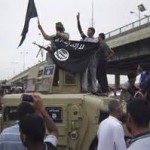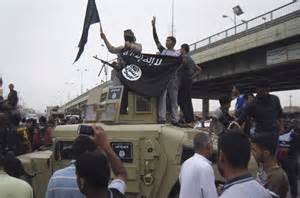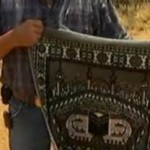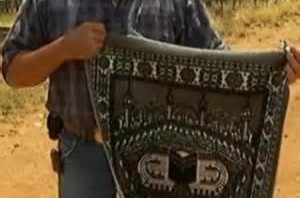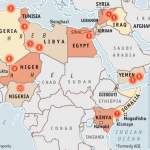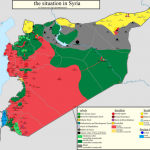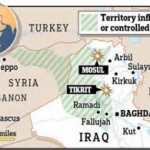|
Al-Baghdadi’s Blitzkrieg, ISIL’s Psychological Warfare, and What It Means for Syria and Iraq
By Bryan Price, Dan Milton, and Muhammad al-`Ubaydi
The Islamic State in Iraq and the Levant’s (ISIL) blitzkrieg-like advance across northern and western Iraq in the past 48 hours poses a serious security threat to the Nuri al-Maliki government. The organization now enjoys control over a strategic swath of territory spanning from eastern Syria into western Iraq, from Falluja in Anbar Province all the way to Mosul in northern Ninawa Province. After taking control of Mosul, Iraq’s second largest city, the group drove south to Saddam’s hometown of Tikrit, and it is currently fighting for control of Samarra and Balad just 50 miles north of Baghdad. The events in recent days have important implications for the future of Iraq, the ISIL, and the conflict in Syria.
Thus far, the overwhelming success of the ISIL’s march to the doorstep of Iraq’s capital was not based on sheer luck, but rather part of a carefully planned and executed expansion plan to make good on the group’s namesake goal—the creation of an Islamic State in Iraq and the Levant. There are other factors beyond the ISIL’s military prowess, however, that also contributed to the success of this recent campaign.
Taking advantage of the widespread discontent toward al-Maliki’s government from Sunni Iraqis living in western and northern parts of the state, the group encountered relatively weak resistance from government security forces. The ISIL’s march was also assisted by tepid resistance from the local population, and in some cases active assistance from local Sunnis, including other minor Sunni insurgent groups like Jaysh Rijal al-Tariqa al-Naqshabandiya and Ansar al-Sunna. Once the top military leadership in Mosul fled north to Kurdistan via helicopter, many of the remaining Iraqi soldiers shed their uniforms and blended into the populace.
Additionally, the ISIL now enjoys the spoils of victory that will make it an even more potent organization and a thornier problem for the Iraqi government to address. After raiding several military bases in the region, the ISIL now possesses scores of Iraqi military equipment originally provided by the United States, from Humvees and cargo vehicles to small arms. There is already a picture on Twitter of Abu `Umar al-Shishani, the military commander of the ISIL in Syria, stepping out of his personal Humvee. Several posters on jihadist web forums and Twitter have sent out requests for helicopter pilots to potentially fly some of the aircraft that the ISIL captured in recent days.
According to the governor of Ninawa, the ISIL has looted several banks across the province, including an alleged $429 million dollar score from Mosul’s Central bank. The ISIL will also seek to profit from the Baiji oil refinery, one of Iraq’s largest, and a facility that produces more than 300,000 barrels per day.
The ISIL has also freed thousands of prisoners in its push south, including from four prisons in Mosul and one in Tikrit. According to the ISIL, the military commander behind the Mosul invasion, Abu `Abd al-Rahman al-Bilawi, was killed during the first day of fighting, and the ISIL has subsequently named the operation after him. Al-Bilawi was himself a former inmate freed in 2012.
Perhaps the greatest benefit derived from the ISIL’s recent operation is its enhanced credibility. The combination of the ISIL’s ferocious and bloodthirsty reputation and the glaring ineptitude of Iraq’s security forces are likely to push some disgruntled Sunnis, including those who were previously on the fence, over to the ISIL’s side. The group has been a long-time critic of what it believed to be a corrupt and incompetent Shi`a-led government, and it has continuously declared al-Maliki’s forces incapable of protecting the Iraqi people. The performance of the government’s security forces thus far only strengthens the ISIL’s argument.
An aspect of the ISIL’s expansion plan that has been somewhat overlooked in most mainstream media accounts is the group’s skillful use of psychological warfare. Virtually all Islamic extremist groups make use of social media to advance their causes, but the ISIL’s media production team is especially adept, and its target audience extends beyond the Arabic-speaking world. Less than 24 hours after their successful campaign against Mosul, the ISIL published the third issue of its English-language magazine, Islamic State News, complete with pictures detailing its military victory and various economic development programs helping the people of Iraq. Launching this a day after a major military campaign shows that the group is media savvy and intent on improving its image among its supporters and new recruits, including those in the West.
Like most extremist groups fighting in the region, the ISIL is active on web forums and social media, including Facebook and Twitter. A recent propaganda video released by the group, however, deserves special mention. Its implicit goal was to instill fear and terror in the populace, and may be a contributor to the lack of meaningful resistance from both the security forces and the populace. A little over three weeks ago, the ISIL’s media wing, al-Furqan, released a professionally-edited film called Sounds of the Swords Clashing 4 that has since gone viral in Iraq. The graphic nature of the film showcases both the ISIL’s ruthlessness and its organizational capability.
The hour-long film depicts ISIL members dressed in the same uniforms worn by Iraqi Special Forces units conducting late-night house calls to prominent Iraqi Army officers and government counterterrorism officials. To quickly resolve what they believe to be some sort of mistaken identity mix-up, the unsuspecting victims openly reveal their government affiliations and their official counterterrorism duties, only to realize their interrogators are ISIL operatives. The film graphically shows several gruesome executions, including one where ISIL members decapitate a top official in Samarra’s counterterrorism unit in his own bedroom. Another grizzly scene shows ISIL members taunting a father and son while they are forced to dig their own graves prior to their executions.
The ISIL’s military capability and its prowess in psychological warfare put the al-Maliki government in a difficult situation. In the short-term, rolling back the ISIL’s territorial gains will not be easy without external support. That said, even if al-Maliki regains the territory lost in recent days, military successes will not solve Iraq’s deep sectarian cleavages or its underlying problems of ineffective governance.
The ISIL’s recent victories have made the group more popular and more powerful, but it too faces daunting challenges in the days ahead. It is difficult to fight an enemy on two fronts, yet the ISIL finds itself fighting multiple enemies on multiple fronts. In Syria, the ISIL is not only battling pro-Assad forces, but it is fighting sister extremist groups such as Jabhat al-Nusra, the al-Qa`ida affiliate it once tried to subordinate, Kurdish groups like the PKK in northeastern Syria that are vying for control of the resource-rich al-Hasakah Province, and other Islamic and nationalist opposition groups. On June 11, the ISIL kidnapped the head of the Turkish consulate in Mosul and more than 40 of his staff members, a move that is sure to intensify the Turkish government’s efforts to combat the ISIL. According to a post on al-Fida’, a prominent jihadist web forum, Iran’s Islamic Revolutionary Guard Corps (IRGC) was willing to send two divisions into Iraq to prevent the collapse of the Iraqi government. The IRGC’s website quoted Qassim Suleimani, the commander of the elite Quds Force, but the announcement has since been taken down.
Finally, the ISIL faces the difficult challenge of governing the territory it now controls. The ISIL has steamrolled over the government’s security forces and secured valuable resources that have enhanced its popularity and its capability, but is the ISIL’s proposed alternative of an independent state governed by Shari`a law attractive to Iraqis in the long-term? In view of the ISIL’s recent successes, the answer is probably no. For example, although the ISIL enjoyed surprising success during its January 2014 campaign in Anbar Province, an operation in which it gained and maintained control over much of Falluja and Ramadi, it was unable to fully exploit these victories in other parts of the province. Despite fighting in an overwhelmingly Sunni province known for its staunch criticism of the al-Maliki government, the ISIL faced powerful tribal leaders in Anbar who saw the group as a threat to their autonomy and their own personal interests. It is one of the reasons why the ISIL’s current thrust to Baghdad is coming from the north, from Mosul down to Samarra, rather than west to east through Anbar.
In the short-term, however, the ISIL will try to appeal to the people’s deep frustration over al-Maliki’s lack of governance and a pervasive sense of disenfranchisement common in Iraqi politics. The ISIL already has enjoyed some success in providing public goods and local governance throughout Syria in places like Raqaa, and the ISIL will likely adopt a similar model in Mosul. Despite a day of chaos in Mosul that saw thousands flee the city and others afraid to go to work, the ISIL allegedly went door to door around the city to calm citizens and reassure them that the ISIL has their best interests at heart. The ISIL published a wathiqat almadina, a list of rules for the city based on Shari`a law, and today there are reports that many have returned to work in Mosul and the city is functioning somewhat normally. It will be a crucial test of the ISIL’s capabilities if they are able to maintain this sense of normalcy in the days and weeks ahead.
It is impossible to forecast how this crisis will end. By centralizing power and marginalizing meaningful Sunni political participation, Nuri al-Maliki may have dug a hole that his security forces cannot pull him out of without outside help. On the other hand, the ISIL has significantly increased its relative power in the past few days, but only time will tell if its gamble will pay off or whether it has overestimated its ability to effectively govern the territory it now controls.
Bryan Price is the Director of the Combating Terrorism Center at the United States Military Academy at West Point.
Dan Milton is an Assistant Professor at the Combating Terrorism Center at the United States Military Academy at West Point.
Muhammad al-`Ubaydi is a research assistant at the Combating Terrorism Center and monitors Arabic jihadist websites.
The views presented are those of the authors and do not necessarily represent the views of the Department of Defense, the U.S. Army, or any of its subordinate commands.
Combating Terrorism Center
|

